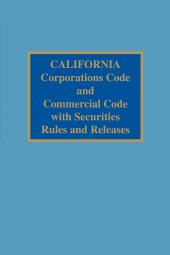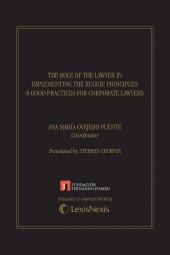The Role of the Lawyer in Implementing the Ruggie Principles: 8 Good Practices For Corporate Lawyers
Select a format
 International Order Inquiry
International Order Inquiry
Select subscription type
Terms & conditions
Subscribers receive the product(s) listed on the Order Form and any Updates made available during the annual subscription period. Shipping and handling fees are not included in the annual price.
Subscribers are advised of the number of Updates that were made to the particular publication the prior year. The number of Updates may vary due to developments in the law and other publishing issues, but subscribers may use this as a rough estimate of future shipments. Subscribers may call Customer Support at 800-833-9844 for additional information.
Subscribers may cancel this subscription by: calling Customer Support at 800-833-9844; emailing customer.support@lexisnexis.com; or returning the invoice marked "CANCEL".
If subscribers cancel within 30 days after the product is ordered or received and return the product at their expense, then they will receive a full credit of the price for the annual subscription.
If subscribers cancel between 31 and 60 days after the invoice date and return the product at their expense, then they will receive a 5/6th credit of the price for the annual subscription. No credit will be given for cancellations more than 60 days after the invoice date. To receive any credit, subscriber must return all product(s) shipped during the year at their expense within the applicable cancellation period listed above.
The total price includes the product(s) listed in the Order Form and any Updates for a limited period (minimum period of 30 days) after the order is placed ("Order Window"). Shipping and handling fees are not included in the grand total price.
All shipments may be returned, at subscribers' expense, for full credit of the Price within 30 days of receipt.
Shipments may not be returned, and no credits will be issued, more than 30 days after receipt.
After the Order Window, subscribers will receive notice of Updates along with the then-current grand total price and order process as Updates become available. Subscribers will only be shipped those Updates they specifically request.
Product description
The new "compliance duties" for companies are transforming step by step how to conduct business. The ethics in business theories are key instruments in this transformation and United Nations’ initiatives, as the Business and Human Rights movement, have boosted it. The lawyer of the future should assume its ethical and professional duties, accordingly with its social responsibilities and social leadership. Consequently, internal codes of conduct and deontological rules redefine the professional obligations and entail a new commitment of public service to which all lawyers are called to professionally. It means a different definition for the legal profession itself: the lawyer as an actor and servant of justice, of the Rule of Law, and human rights.
The United Nations Guiding Principles--and the obligations of respect assumed by companies--acquire an enormous relevance, because they determine the basis for a new healthy client-lawyer relationship, based on its compliance with the Ruggie framework for business. The UN's Ruggie Principles impact the definition of these ethical obligations by defining how the lawyer should be with the client. The UN Guiding Principles should be read in a manner compatible with the ethical obligations of the legal profession, and in the same way, professional ethical codes should be reinterpreted in the light of the fundamental role played by lawyers in defending the Rule of Law and the respect of human rights.
The conclusion is that the fundamental role of lawyers is the pursuit of the Rule of Law, which undoubtedly involves their proactive action in the defense and respect of human rights when exercising their profession as business lawyers. It complements the traditional and exclusive interpretation of the social function of the lawyer as a servant of justice, and encourages the assumption of their leadership in the transformation of ethically responsible businesses.
"The Role of the Lawyer in Implementing the Ruggie Principles: 8 Good Practices For Corporate Lawyers" focuses on this implementation of the UN's Guiding Principles on Business and Human Rights and provides detail for business lawyers to gain an understanding of these Principles and what they require for their clients and also with respect to their own conduct.
eBooks, CDs, downloadable content, and software purchases are noncancelable, nonrefundable and nonreturnable. Click here for more information about LexisNexis eBooks. The eBook versions of this title may feature links to Lexis+® for further legal research options. A valid subscription to Lexis+® is required to access this content.
Table of contents
PROLOGUE
Chapter 1: THE RUGGIE PRINCIPLES AND THE NEW UNITED NATIONS REFERENCE FRAMEWORK
Chapter 2: IDENTIFYING THE SUBJECTS OF OBLIGATIONS AND RECOMMENDATIONS
Chapter 3: NATIONAL IMPLEMENTATION OF THE GUIDING PRINCIPLES
Chapter 4: SUSTAINABILITY OF THE LEGAL BUSINESS, CORPORATE SOCIAL RESPONSIBILITY AND COMPLIANCE WITH THE UNITED NATIONS GUIDING PRINCIPLES
Chapter 5: RESPECT FOR PROFESSIONAL CODES OF CONDUCT AND ETHICS
Chapter 6: SOME REFLECTIONS ON THE IMPACT OF THE GUIDING PRINCIPLES ON THE DUAL ROLE OF THE LAWYER: ACTING LOYALLY AND DILIGENTLY, AS AN AGENT OF THE RULE OF LAW AND JUSTICE
Chapter 7: GOOD PRACTICES FOR THE IMPLEMENTATION OF THE RUGGIE PRINCIPLES WHEN PROVIDING LEGAL ADVICE TO BUSINESSES
Related products
-
New!Preorder
 California Corporations Code and Commercial Code with Securities Rules and ReleasesNew!Estimated: December 18, 2024$239.00
California Corporations Code and Commercial Code with Securities Rules and ReleasesNew!Estimated: December 18, 2024$239.00 -
 Marine Insurance: Forms and Protection and Indemnity Club Rules$3,218.00
Marine Insurance: Forms and Protection and Indemnity Club Rules$3,218.00 -
New!Preorder
 Deering's California Desktop Code Set SoftboundNew!Estimated: December 30, 2024$636.00
Deering's California Desktop Code Set SoftboundNew!Estimated: December 30, 2024$636.00
 Lexis Nexis
Lexis Nexis 